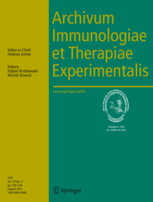
ARCHIVUM IMMUNOLOGIAE ET THERAPIAE EXPERIMENTALIS
Scope & Guideline
Advancing the Frontiers of Immunology and Therapy
Introduction
Aims and Scopes
- Immunological Mechanisms:
The journal extensively covers the mechanisms of immune responses, including topics like T cell function, cytokine signaling, and the role of various immune cells in disease processes. - Therapeutic Innovations:
A key focus is on experimental therapies and innovations in immunotherapy, particularly regarding conditions like cancer, autoimmune diseases, and infectious diseases. - Translational Research:
The journal emphasizes studies that bridge laboratory findings with clinical applications, aiming to translate basic immunological research into therapeutic strategies. - Pathogen-Host Interactions:
Research exploring the dynamics between pathogens and host immune responses, including studies on viral infections and autoimmune responses. - Regulatory and Tolerogenic Mechanisms:
The journal addresses how immune tolerance and regulation can impact disease progression and therapy, especially in transplantation and autoimmune disorders. - Emerging Technologies in Immunology:
The incorporation of new technologies such as genomics, proteomics, and artificial intelligence in understanding immune responses and developing therapies.
Trending and Emerging
- Cancer Immunotherapy:
An increasing number of studies focus on immunotherapeutic approaches in oncology, highlighting CAR-T cell therapy and other innovative strategies to enhance anti-tumor immunity. - Impact of Microbiome on Immunity:
Research exploring the role of gut microbiota in modulating immune responses and its implications for various diseases is gaining traction, indicating a broader interest in microbiome-immune interactions. - Artificial Intelligence in Immunology:
There is a growing interest in the application of artificial intelligence and big data analytics to understand immune responses and improve therapeutic strategies. - Vaccine Responses and Immunogenicity:
With the emergence of new pathogens, studies assessing vaccine efficacy and immune responses, especially in the context of COVID-19, are increasingly prevalent. - Personalized Medicine in Immunotherapy:
The trend towards personalized approaches in immunotherapy, including tailored treatments based on individual genetic and immunological profiles, is becoming more prominent.
Declining or Waning
- Traditional Autoimmune Disease Models:
Research using conventional autoimmune disease models appears to be waning, possibly due to a shift towards more complex and translational models that better mimic human diseases. - Single Disease Focus:
There is a noticeable decline in studies focusing solely on individual diseases, with more research now emphasizing holistic and systems biology approaches. - Basic Immunology without Clinical Relevance:
Studies that explore basic immunological principles without clear clinical implications are becoming less frequent, reflecting a trend towards research with direct therapeutic applications.
Similar Journals

BMC IMMUNOLOGY
Fostering Collaboration in Immunological DiscoveriesBMC Immunology is a prominent open-access journal published by BMC that has been at the forefront of immunological research since its inception in 2000. Based in the United Kingdom, this journal aims to advance the understanding of immune system functions and disorders through high-quality, peer-reviewed articles. With an impressive scope encompassing various facets of immunology, BMC Immunology has earned a Q3 ranking in the Immunology category according to the 2023 category quartiles, demonstrating its growing impact and relevance in the scientific community. Researchers and professionals will find valuable insights in its array of published works, spanning both foundational studies and innovative applications. The journal's commitment to open access ensures that cutting-edge research is freely available, fostering collaboration and advancement in the field. For those looking to stay updated on the latest developments in immunology, BMC Immunology stands as an essential resource for researchers, professionals, and students alike.
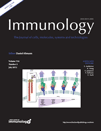
IMMUNOLOGY
Connecting Basic Science with Clinical ApplicationsIMMUNOLOGY is a premier journal published by Wiley that has been at the forefront of the field since its inception in 1958. With an impressive impact factor and classified in the Q1 quartile for both Immunology and Allergy as of 2023, this journal is highly regarded among researchers and professionals alike. It ranks 36th out of 233 in the Medicine/Immunology and Allergy category, and 40th out of 236 in the Immunology and Microbiology segment on Scopus, placing it firmly within the top percentile of its field. The journal is dedicated to publishing high-quality research that advances our understanding of immunological processes, bridging basic science with clinical applications. Although it does not operate under an open-access model, it offers conventional access options that remain integral to the dissemination of vital immunological research. With its broad scope and commitment to scholarly excellence, IMMUNOLOGY continues to serve as an essential resource for those seeking the latest advancements in immunology, fostering innovation and collaboration among scientists globally.
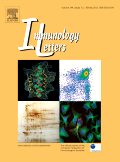
IMMUNOLOGY LETTERS
Connecting Researchers to the Heart of ImmunologyIMMUOLOGY LETTERS, published by Elsevier, is a distinguished journal in the field of immunology, focusing on the latest advancements and findings that significantly influence immunological research and clinical applications. Established in 1979, the journal has evolved to cater to a global readership, featuring high-quality peer-reviewed articles across a diverse spectrum of topics related to immunity and allergic responses. With an impressive Q2 category ranking in both Immunology and Allergy as of 2023, it holds a strong position within the scientific community, evidenced by its commendable Scopus rankings (Rank #71/233 in Medicine - Immunology and Allergy and Rank #85/236 in Immunology and Microbiology - Immunology). While primarily subscription-based, the journal aims to foster knowledge dissemination that encourages collaboration among researchers and practitioners alike, making significant contributions to the understanding of immune mechanisms. The journal is integral for educators, students, and professionals aiming to stay abreast of current trends and breakthroughs in the immune system's intricate functions.
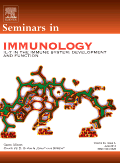
SEMINARS IN IMMUNOLOGY
Transforming Knowledge into Immunological InnovationSEMINARS IN IMMUNOLOGY, published by Academic Press Ltd - Elsevier Science Ltd, stands as a leading journal in the field of immunology and allergy, with an impressive impact factor that reflects its significant contribution to advancing research and discourse within these vital areas of medical science. Established in 1989, this esteemed journal has garnered a reputation for disseminating high-quality, peer-reviewed articles that span a broad spectrum of immunological topics, making it an essential resource for researchers, healthcare professionals, and students alike. Currently ranked Q1 in both Immunology and Allergy categories, SEMINARS IN IMMUNOLOGY ranks 39th among 233 journals in Immunology and Allergy and 43rd among 236 in Immunology and Microbiology according to Scopus, placing it in the 83rd and 81st percentiles respectively. This underscores its pivotal role in shaping the future of immunological research and clinical practices. While the journal operates under a subscription model with no open access option, it remains committed to providing comprehensive insights and fostering scholarly collaboration within the global immunology community.
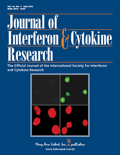
JOURNAL OF INTERFERON AND CYTOKINE RESEARCH
Transforming Discoveries into Therapeutic StrategiesJOURNAL OF INTERFERON AND CYTOKINE RESEARCH, published by Mary Ann Liebert, Inc, stands out as a pivotal resource in the fields of immunology, virology, and cell biology, providing comprehensive insights into cytokine functions and their roles in immune responses. With ISSN 1079-9907 and E-ISSN 1557-7465, the journal aims to disseminate innovative research that advances our understanding of interferon and cytokine biology, a crucial aspect for developing therapeutic strategies against various diseases. Covering a broad scope of research from 1995 to 2024, it boasts a respectable impact factor within its category quartiles, ranking Q2 in Medicine (miscellaneous) and Q3 in the domains of Cell Biology, Immunology, and Virology as of 2023. While it does not provide open access options, the journal remains essential for academics, researchers, and professionals dedicated to exploring the complexities of immune signaling pathways and their implications for health and disease. The journal’s consistent contribution to scientific discourse underscores its importance in elevating query-driven studies to foster advancements in biomedical science.

IMMUNOBIOLOGY
Exploring groundbreaking research in immunity and blood disorders.IMMUNOBIOLOGY is a prestigious academic journal published by Elsevier GmbH that significantly contributes to the fields of hematology and immunology. With its ISSN 0171-2985 and E-ISSN 1878-3279, this journal has been disseminating impactful research since 1979, positioning itself at the forefront of immunological and hematological advances. The journal holds a commendable ranking of Q2 in Hematology and Q3 in both Immunology and Immunology and Allergy, indicating its relevance and influence within the scientific community, as reflected by its Scopus rankings. Although IMMUNOBIOLOGY operates under a subscription model, it remains dedicated to expanding knowledge across disciplines, fostering innovative research, and facilitating connections among researchers, professionals, and students. Situated in Munich, Germany, this journal is continually evolving and aims to remain an essential resource for the latest discoveries and insights in the realms of immunity and blood disorders, ultimately enhancing our understanding of complex biological systems.
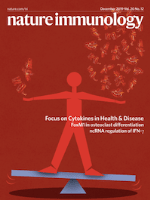
NATURE IMMUNOLOGY
Transforming research into real-world applications in immunology.NATURE IMMUNOLOGY is a premier academic journal published by NATURE PORTFOLIO, dedicated to advancing the field of immunology. With an impressive impact factor that reflects its esteemed position, this journal ranks in the top quartile (Q1) of renowned categories, including Immunology and Allergy. Serving as a crucial platform for researchers, professionals, and students, NATURE IMMUNOLOGY showcases cutting-edge research, comprehensive reviews, and insightful perspectives that drive innovation in immunological science. Based in the United Kingdom, this journal has been a vital contributor to the global discourse on immune responses and related diseases since its inception in 2000. Researchers can benefit from its rigorous peer-review process, ensuring that only high-quality studies are disseminated, thus enhancing their academic pursuits and practical applications. Explore the latest findings and trends within this flourishing discipline, making NATURE IMMUNOLOGY an essential resource for anyone engaged in the study of the immune system.
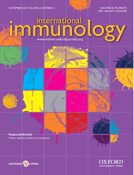
INTERNATIONAL IMMUNOLOGY
Elevating the Standards of Immunological Research Worldwide.INTERNATIONAL IMMUNOLOGY, published by OXFORD UNIV PRESS, stands out as a premier journal in the field of immunology, providing a vital platform for disseminating groundbreaking research and innovative developments within the discipline. With an impressive Q1 ranking in Immunology and Allergy, as well as in Medicine (miscellaneous), it consistently showcases high-impact studies that contribute to the advancement of immunological knowledge. The journal spans over three decades, from its inception in 1989 to its ongoing contributions as of 2024, thus solidifying its reputation in the scientific community. Researchers, professionals, and students will find valuable articles that delve into the complexities of immune responses, therapeutic interventions, and emerging immunological paradigms, ensuring INTERNATIONAL IMMUNOLOGY remains at the forefront of knowledge in the life sciences.
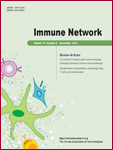
Immune Network
Elevating the Standards of Immunology ResearchImmune Network is a prestigious journal dedicated to disseminating high-quality research in the field of immunology, infectious diseases, and allergy, under the esteemed KOREA ASSOCIATION OF IMMUNOLOGISTS. Founded in 2016, this journal has quickly ascended to a top-tier publication, achieving Q1 rankings in 2023 in multiple relevant categories, including Immunology, Allergy, and Infectious Diseases. With a strong emphasis on innovation and interdisciplinary research, Immune Network appeals to a diverse audience of researchers, professionals, and students keen on advancing the understanding of immune responses and disease mechanisms. However, it is crucial to note that the journal operates under a subscription model without open-access provisions. Its impact factor further solidifies its reputation, reflecting the significant influence of the articles published. Located in South Korea, the journal serves as a global platform for sharing revolutionary insights and fostering collaborations within the immunology community.
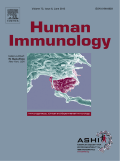
HUMAN IMMUNOLOGY
Advancing the Frontiers of Immune ResearchHUMAN IMMUNOLOGY, published by Elsevier Science Inc, serves as a critical platform for disseminating research in the fields of immunology and allergy, as well as various aspects of miscellaneous medicine since its inception in 1980. With an ISSN of 0198-8859 and E-ISSN 1879-1166, this journal is pivotal for researchers and practitioners looking to advance their understanding of human immune responses and related conditions. The journal currently holds a respectable position within its field, as highlighted by its 2023 Scopus ranks—#114/233 in Immunology and Allergy and #132/236 in Immunology and Microbiology. Moreover, it maintains a Q2 quartile ranking in both Immunology and Allergy and miscellaneous Medicine, underscoring its influence and reach within the scientific community. Although it does not currently offer Open Access options, HUMAN IMMUNOLOGY remains dedicated to providing valuable insights and fostering academic discourse within its discipline, characterized by a rigorous peer-review process and a focus on innovative research trajectories.